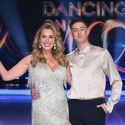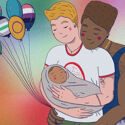
In GLAAD’s Accelerating Acceptance 2017 report, we found that 20% of millennials identify as something other than cisgender and heterosexual. While I shrug off the label of “millennial,” because I’ve heard a range of answers about what generation I am technically a part of, I am proud to be associated with a group of people who are pushing boundaries and making the world a safer place for all identities.
A common misconception about bisexuality+ is that it means that you are only attracted to men and women (typically assumed to be cisgender men and cisgender women). This is untrue. Bisexuality+ means that you have the capacity to be attracted to genders like your own and genders unlike your own. There is no inherent binary to a bisexual+ (bi+) identity, and I am the proof of that as someone who is bisexual+ and nonbinary.
For me, while I have pride in my nonbinary identity, I generally just don’t care very much. I recognize the privilege of this sentiment: I was raised in a supportive family, in a supportive town, in a supportive state (Massachusetts), and in a supportive political era (the Obama administration.) When I was educating myself – and being educated by people I met – about the vast depth of LGBTQ identities, I came to the realization that I believe that gender is a social construct. From that, I explored terminology further, and concluded that I identify as nonbinary.
Nonbinary can have a range of definitions, but is typically used by people who experience their gender identity as falling outside of the categories of man or woman. What’s most important is to listen to a nonbinary person’s own descriptions of their identity. My nonbinary identity means that I don’t identify within the gender binary at all: I am not somewhere between male and female, I reject the gender binary completely.
How about we take this to the next level?
Our newsletter is like a refreshing cocktail (or mocktail) of LGBTQ+ entertainment and pop culture, served up with a side of eye-candy.
When I started writing this piece, I planned to explore the intersection of my nonbinary identity and my bisexual+ identity. However, I often find myself having a greater ease and around discussing my nonbinary gender identity than my bisexual+ identity. When talking about my nonbinary identity, I more or less know the beats to hit: “gender is a social construct,” “I reject the gender binary,” and “as someone who was assigned male at birth, I have a level of privilege, as well as a need to fight back against erasure.” When it comes to bisexuality+, I don’t necessarily have the same type of consistently personal narrative points to hit.
Through my work at GLAAD, I keep a wide variety of bi+ talking points in my back pocket to pull out at any point: “Bi+ people make up the majority of the LGBTQ community,” “Bi+ people face higher rates of intimate partner violence, mood disorders, and economic inequality,” and “Bisexuality+ is no more inherently transphobic than gay/lesbian or straight identities.” But these are all just that: talking points and quick facts to be expanded upon. There’s very little of me in these.
Maybe this comes from a place of caution. By talking about my bisexual+ identity, I open the door to talking about not only my dating life, but the forms of attraction that I’ve felt
—an intensely personal and internal conversation to have. I’ve never particularly liked talking about my own attraction or crushes, and opening conversations about bisexuality+may mean I’ll have to have more of these conversations more often.
Maybe my unintentional reluctance to talk about my bi+ identity stems from a place of insecurity. By talking about my experiences, I could open the door to being invalidated, told “you’re not really bisexual.” I could open the door to being told I need to “prove” my bisexuality+ or that I will someday “pick a side” (sentiments that assume an inherent binary in bisexual+ identities.) I could open the door to being told that I’m “greedy” or in some way “deviant.” This space of “in-between” that my bisexual identity is often forced to occupy is a precarious one: I could be excluded from non-Queer spaces for being “too Queer”—and I could be excluded from Queer spaces for not being “Queer enough.”
And maybe my reluctance to talking about my bisexual+ identity comes from the lack of bi+ -specific spaces to exist. We are shown from young ages that heterosexuality is “the norm,” and queer identities make us feel like we are different, or even shameful. Thankfully, LGBTQ organizations like GLAAD have done an incredible amount of work to accelerate acceptance, and now non-straight people who identify as gay or lesbian are significantly more able to come out safely and live openly (over 70% of gay and lesbian cisgender people are out as gay or lesbian to their loved ones.) However, bi+ people like myself are still waiting for that acceptance —and understanding —to reach us. Only 28%of bisexual+ cisgender people are out to their loved ones. That needs to change.
Non-bisexual+ people often seem to struggle with understanding bisexual+ identities. I enjoy being in a position where I have opportunities to explain the wide range of bisexual+ identities because of the expertise I have gleaned through my work at GLAAD,but there is still often a part of me that questions the widespread phenomenon of people misunderstanding bisexuality+. Why is it considered more “normal” and expected that someone, through the course of their life, be attracted to people who only carry some very specific, very gendered characteristics. Beyond that, it is still widely considered “thenorm” that people will only be attracted to people with certain specific genitals throughout their entire life. This assumption is dangerous towards transgender and gender-nonconforming people, as well as for people who are intersex.
I do feel a level of pride to exist as a bisexual+ person in a world where it is not necessarily easy to have a bi+ identity, and I do also feel proud, nearly joyful, to also exist as a nonbinary person. I hope that someday I will feel more equipped to talk about my bisexual+ identity from a personal lens, and I hope that other bi+ and nonbinary people are allowed the opportunities like the ones I have had. For BiWeek this year, 20biteen, I hope we can all commit to sharing our stories—and that those who hear them will truly listen.
Mackenzie Harte is the Coordinator for the GLAAD Media Institute.
From September 16-23, join GLAAD, the Bisexual Resource Center, and Still Bisexual in recognizing the bisexual+ community for Bisexual+ Awareness Week, culminating in Celebrate Bisexuality+ Day on September 23.
Co-founded by GLAAD and BiNet USA, Bisexual+ Awareness Week seeks to accelerate acceptance of the bi+ (pansexual, fluid, no label, queer, etc.) community. #BiWeek draws attention to the experiences, while also celebrating the resiliency of, the bisexual+ community. Starting this year, Bisexual+ Awareness Week will take place every September 16th – 23rd.
Throughout #BiWeek, allies and bi+ people learn about the history, culture, community, and current policy priorities of bi+ communities.




















thisisnotreal
Seriously? While we’re throwing out all forms of science and reality why don’t we just push it a step further and say that penises and vaginas are a social construct and we reject those too. I mean who needs science and basic lessons in biology anyways when we can just rewrite reality to suit our whims right?….
AydenRodriguez1411
Seriously? While we’re throwing out all form….- Nothing to add But i am here not only to discuss this article but I would like to share with you new but very cool website for gay singles only. It is still private, but you can find it easy. Use the most famous search engine to find it: “E0jMsdMfugu6lu2083953” .
cliche guevara
A basic pillar of science is the understanding that the body of scientific knowledge adjusts over time as we learn more. For example, we have learned about evolution since Darwin wrote Origin of the Species and science has adjusted accordingly rather than staying stuck in time. What you seem be espousing is closer to Dogma. If you don’t want to be bothered with humanities further understanding of sex, sexuality and gender identity then that is fine but throwing a fit about science only to demonstrated that you don’t grasp the basics of that either is just ridiculous.
RIGay
There is just this incredibly LARGE population of people out there that we, as a country, just refuse to go out of our way to make feel accepted. How about this, people – pass on a goat yoga class for a morning, put down your therapy duck and smart phones and let’s have an honest conversation about overcoming racism in our society.
How does that sound?
Donston
Instead of being about educating people this article is merely about promoting “labels”, telling us how important “labels” are and telling the “younger generation” not to abandon the bi identity. This is one of the bigger issues with the “bi movement” from a political and social media standpoint. Too much of it is more about self-victimization and supporting bi identity more than anything else.
Donston
This article does support a point I made on this site a few days ago. Cis women may view themselves as non-binary/gender fluid/genderqueer, but they tend not to take gender identity as dead seriously as some cis males. I’ve still yet to see a cis woman consistently refer to herself as them/they/it. That is almost an exclusively cis white male thing. A more interesting article would be examining why that particular demo has by far embraced that trend more than any other and why that particular demo is more caught up in gender than any other in the “queer community”. The whole “bisexuals are more likely to suffer from depression” belief has some truth. However, it’s hard to get a good consensus when it comes to the “lgbtq community” because identity politics is always evolving, and people can identify as whatever they wish. Furthermore, it seems people who have a legit degree of bisexuality or fluidity in their orientation are slightly more likely to have suffered from sexual abuse and sexual traumas than people who are inherently homo throughout their lives. So, that is likely something that contributes to those depression rates. Blaming it all on sociology or ignorance feels like a cop-out.
Aires the Ram
Bisexual+
non-binary
cis
Where does all this madness with these labels stop? I’ve been around the gay a community longer than many of you reading this have been on this earth, and I’ve NEVER seen this level of stupidity and divisiveness.
cliche guevara
There is nothing divisive about people defining the sex, sexuality or gender identity. If fact, it has absolutely no impact on you whatsoever. Now, running around an calling people stupid because they have the audacity to speak freely about who they are, that is divisive.
JJinAus
Mad. I am male and I like males. I do not apologise for who I am. That said, people can identify and desire anything they wish and it does not affect me. Just don’t tell me how I should live.
Donston
That is where I stand. It seems as if there’s this desire from a certain section of the “queer community” to get people to embrace or abandon their sense of self and abandon certain identities. The focus should be entirely on educating people and expressing yourself. Not trying to dictate anything for anyone else and identity promotion.
Rock-N-RollHS
fluidity and queerness is simply another kind of homophobia in new clothes.
Donston
Don’t dismiss everything you don’t understand. Is there homophobia, internalized homophobia, homo shame, same-sex preference shame, “straight” obsessions, self-misandry, self-misogyny in the “lgbtq community”? Yeah. And is some of it attached to this abundance of identities stuff? Yeah. But there are people who’s sense of gender and/or gender expressions shift with age. There are people who have the romantic, sexual, affection and/or relationship aspects of their orientation shift throughout the years. You can’t really truly know anyone and anyone’s sense of self. And not everything addition is driven by hate or resentment or shame. I just wish there was less hyper focus on identity and hyping “labels” in general.
hansniemeijer
I thought of a new “label” to get rid of box ticking. RAINBOW PEOPLE, which just means everybody.
Because we all live under the rainbow(s) in the sky of this planet.
GymMan456
Binary surfer? Gender gradient ?
Why no pics of the author, they are out there and searchable. They are kind of matching. I am still looking for another plain man.